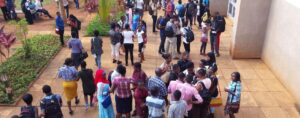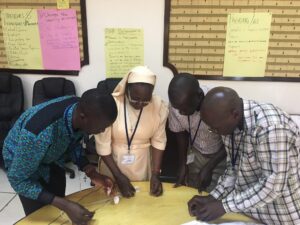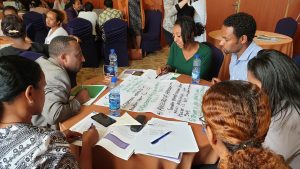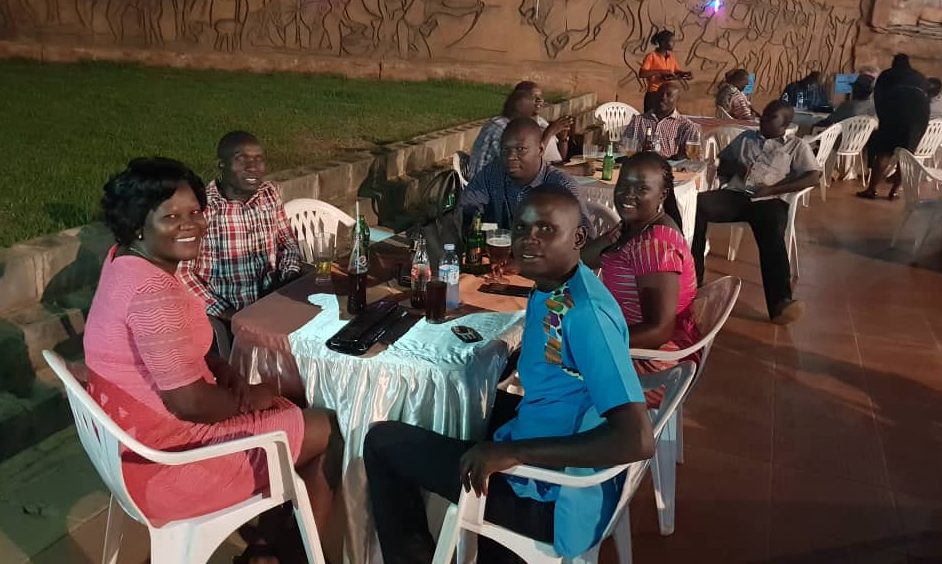
Transforming learning and connecting communities to support higher education
A First-class pass [in a degree] is nothing if one can’t be employed or create jobs. Is this what we want? Isn’t this an embarrassment? We want our university to create critical thinkers who can see what is essential outside [the university] and be able to solve the problems. Those who can go beyond what is available. This transformative project is all about encouraging graduates, whether doctors, teachers, or farmers, who creatively seek alternative and better ways of doing things. As a university, we need interaction with the business community and other community partners to achieve these goals and build a stronger community.
These were some of the opening remarks from Gulu University Vice Chancellor Professor George Openjuru at a Transforming Communities stakeholder engagement and learning evening earlier this year.
The evening was initiated by Gulu University’s joint advisory group (JAG), which was established as part of the Transforming Employability for Social Change in East Africa (TESCEA) partnership. TESCEA aims to strengthen the employability of higher education students in Tanzania and Uganda and the joint advisory groups have an important role in helping to connect the universities with local companies, civil society and others.
It was the goals of developing a greater sense of community around TESCEA at Gulu University in Uganda, inspiring relationships and connections among the various participants and emphasizing the need for the university to connect with the real world that inspired the evening. The event brought together more than 50 participants, including members of the JAG, students, teaching staff and members of the TESCEA partnership at Gulu, to share stories about why we are all involved in TESCEA, and provoke creative and innovative ideas for success.
Improving links between universities and employers
The event included a series of short stories from a few of our JAG members, starting with Moses Onono, a local farmer and educator working with 1000 students and building capacity for sustainable farming practices with 400 farmers. He emphasized the need for improved synergies and advised universities to be friendlier with other sectors if they want to successfully develop critical thinking and problem-solving skills among graduates.
Another speaker was local entrepreneur, Vincent Ouma, who challenged the students and teachers to focus on learning how to think, not what to think.
Finally, in her closing remarks, the honourable Francesca Amony applauded the efforts of the university to transform the community and reminded us that the JAG members have skills that can benefit the students. She emphasized that, while teachers and students need to do things differently, the TESCEA implementation needs to embody its own goals of creativity, critical thinking, innovation and doing things differently. She challenged everyone to move beyond the status quo and get out of our comfort zones. She encouraged communication among the diverse actors and wished members a healthy working relationship as we move forward together.
The evening was about ideas and networking. It gave the TESCEA participants an opportunity to get to know each other a little better and created a space for reflection, inspiration and imagination. It was an important first step to build relationships between instructors and community members who will need to work more closely together as we move past a first class pass mentality towards a pedagogy of liberation that can change our future.
Learning from each other
Knowledge and control of knowledge (and whose knowledge counts) is power that is used as a justification 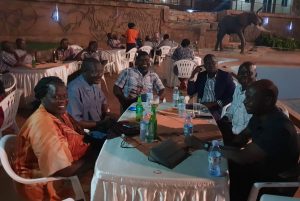 to control and colonize. Knowledge has also been used as a tool of liberation, solutions, and change. The process of teaching is in fact the teaching – it is a reflection of both the world we want and how we think it can be built. The TESCEA partnership introduces education that builds empowered actors capable of both imagining a better world and finding the solutions needed to build it.
to control and colonize. Knowledge has also been used as a tool of liberation, solutions, and change. The process of teaching is in fact the teaching – it is a reflection of both the world we want and how we think it can be built. The TESCEA partnership introduces education that builds empowered actors capable of both imagining a better world and finding the solutions needed to build it.
Overall the stakeholder evening was a tremendous success. You cannot predict or measure the extent of the impact of bringing a group of remarkable people together. Indeed, a student stood up as we were about to leave and introduced his new book “Education is not the key”. He passionately told us the failures of the education system through his own life story. His uncontainable outburst was an important reminder to us all that we are all learning, and just how important all of the participants – including the students – are in designing and implementing a new way of learning in our institutions. More importantly, it was a stark reminder of just what is at stake: the future of our youth, the future of our country, the future of our world.
***
Transforming Employability for Social Change in East Africa (TESCEA) is helping young people in Tanzania and Uganda to use their skills and ideas to tackle social and economic problems. With partners in Tanzania, Uganda and Kenya, TESCEA supports universities, industries, communities and government to work together to create an improved learning experience for students – both women and men. This improved learning experience fosters the development of critical thinking and problem-solving skills, and allows for practical learning beyond the classroom that improves a graduate’s employability.
The TESCEA partnership is led by INASP (UK), working with Mzumbe University (Tanzania), University of Dodoma (Tanzania), Gulu University (Uganda), Uganda Martyrs University (Uganda), Association for Faculty Enrichment in Learning and Teaching (Kenya), LIWA Programme Trust (Kenya) and Ashoka East Africa (Kenya).
TESCEA is funded by the UK’s Department for International Development (DFID) as part of DFID’s SPHEIR (Strategic Partnerships for Higher Education Innovation and Reform) programme to support higher education transformation in focus countries in Sub-Saharan Africa, Asia and the Middle East.
To learn more about TESCEA, click here.

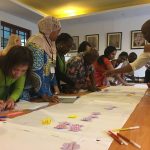 Previous Post
Previous Post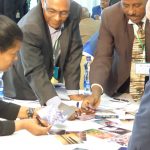 Next Post
Next Post